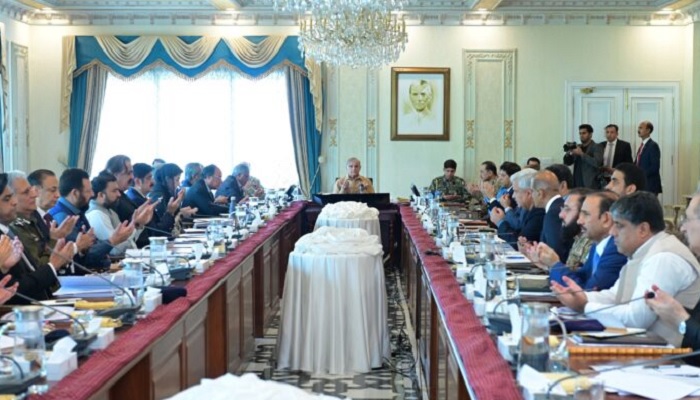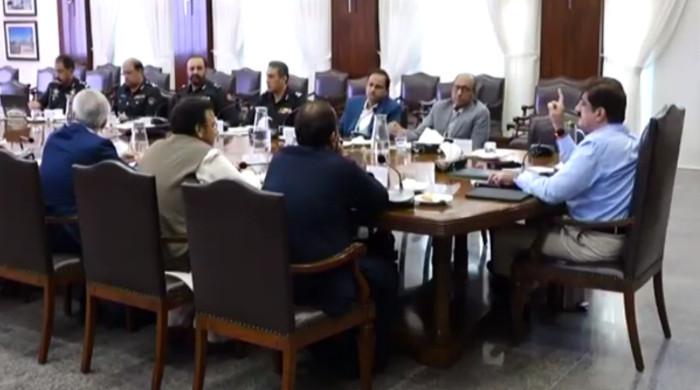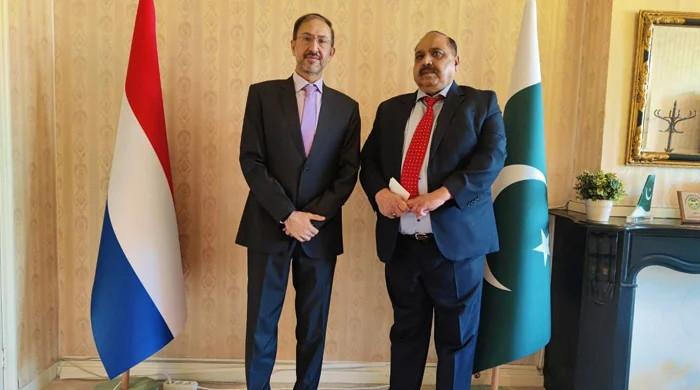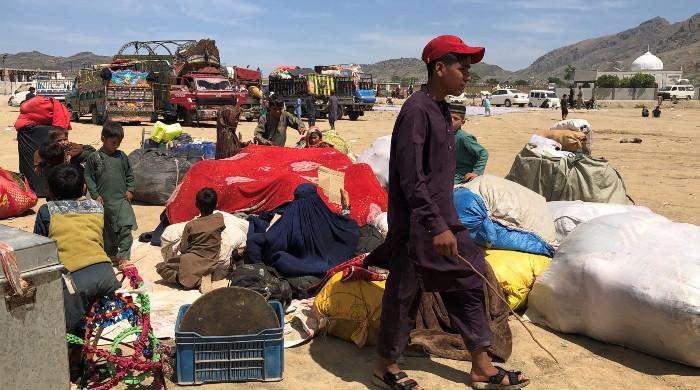PM Shehbaz greenlights Operation 'Azm-e-Istehkam' to turn up the heat on terrorism
"'Azm-e-Istehkam' will synergise multiple lines of effort to combat menaces of extremism and terrorism," PMO says
June 22, 2024

- Operation Azm-e-Istehkam to boost Pakistan's anti-terror drive: PM
- Prime Minister says no one will be allowed to challenge state's writ.
- Meeting reviews measures to ensure foolproof security for Chinese.
Prime Minister Shehbaz Sharif on Saturday gave the go-ahead to Operation "Azm-e-Istehkam", a reinvigorated and re-energised national counter-terrorism drive, to turn up the heat on militants targetting the state of Pakistan.
This critical decision came to the fore during a meeting of the Central Apex Committee on National Action Plan (NAP).
According to an official statement issued by the Prime Minister Office (PMO), the new counter-terrorism push has been approved with the consensus of all stakeholders including provinces, Gilgit Baltistan (GB) and Azad Jammu and Kashmir (AJK).
"The approval of the Operation Azm-e-Istehkam symbolises the national resolve to eradicate all forms of extremism and terrorism from the country," the release said.
The meeting was attended by chief ministers of all provinces and GB, services chiefs, and chief secretaries of the provinces along with other senior civilian, military, and law enforcement agencies officers.
“Operation Azm-e-Istehkam will integrate and synergise multiple lines of effort to combat the menaces of extremism and terrorism in a comprehensive and decisive manner,” the PMO press release said.
During the meeting, the premier stressed that the Operation Azm-e-Istahkam would play a crucial role in countering terrorism threats in the country. "Diplomatic efforts will be intensified to root out terrorist organisations," the PM said.
The forum reiterated that the fight against extremism and terrorism is Pakistan's own and vowed not to allow anyone to challenge the writ of the state.
In the meeting, measures to ensure foolproof security for Chinese citizens were also reviewed, reflecting the government's commitment to the safety of foreign nationals in Pakistan.
The session comprehensively reviewed the ongoing counter-terrorism campaign and assessed the internal security situation, the PMO office said.
“The forum reiterated that the fight against extremism and terrorism is Pakistan’s war and is absolutely essential for the nation’s survival and well-being. The forum resolved that no one will be allowed to challenge the writ of the state without any exception,” it was added.
The handout further said that the progress on the multi-domain tenets of the National Action Plan was scrutinised, with particular emphasis on identifying shortcomings in the implementation for addressing the same as a top priority.
The meeting underscored the necessity for a comprehensive and reinvigorated counter-terrorism strategy, founded on complete national consensus and system-wide synergy.
It said in the politico-diplomatic domain, efforts would be intensified to curtail the operational space for terrorists through regional cooperation.
The renewed and full-blown kinetic efforts of the armed forces would be augmented by full support from all the law enforcement agencies, it said.
They will be empowered by effective legislation to address legal voids that hindered the effective prosecution of terrorism-related cases and award of exemplary punishments to them, the press release added.
According to the PMO handout, the campaign would be duly complemented by socioeconomic measures aimed at addressing genuine concerns of the people and creating an environment that discourages extremist tendencies.
The information space would be leveraged to promote a unified national narrative in support of the campaign, it added.
The forum also reviewed measures to ensure foolproof security for Chinese nationals in Pakistan.
Following the prime minister’s approval, new standard operating procedures (SOPs) were issued to relevant departments, which would enhance mechanisms for providing comprehensive security to Chinese citizens in Pakistan.
The meeting was attended by key ministers of the federal cabinet including the Deputy Prime Minister and Foreign Minister Ishaq Dar, Defence Minister Khawaja Asif, Interior Minister Syed Mohsin Naqvi, Finance Minister Muhammad Aurangzeb, Law Minister Azam Nazeer Tarar and Information Minister Attaullah Tarar.
The NAP committee meeting comes as the country grapples with the challenge of extremism in the country.
According to the Centre for Research and Security Studies (CRSS) Q1 2024 Security Report, at least 92% of all fatalities and 86% of attacks, including those related to terrorism and security forces operations, were recorded in the Khyber Pakhtunkhwa and Balochistan provinces in the first quarter of 2024.
The report further detailed that the country witnessed at least 432 violence-linked fatalities and 370 injuries among civilians, security personnel, and outlaws resulting from as many as 245 incidents of terror attacks and counter-terror operations.
Among the 432 fatalities, 281 were civilians and security forces personnel.












